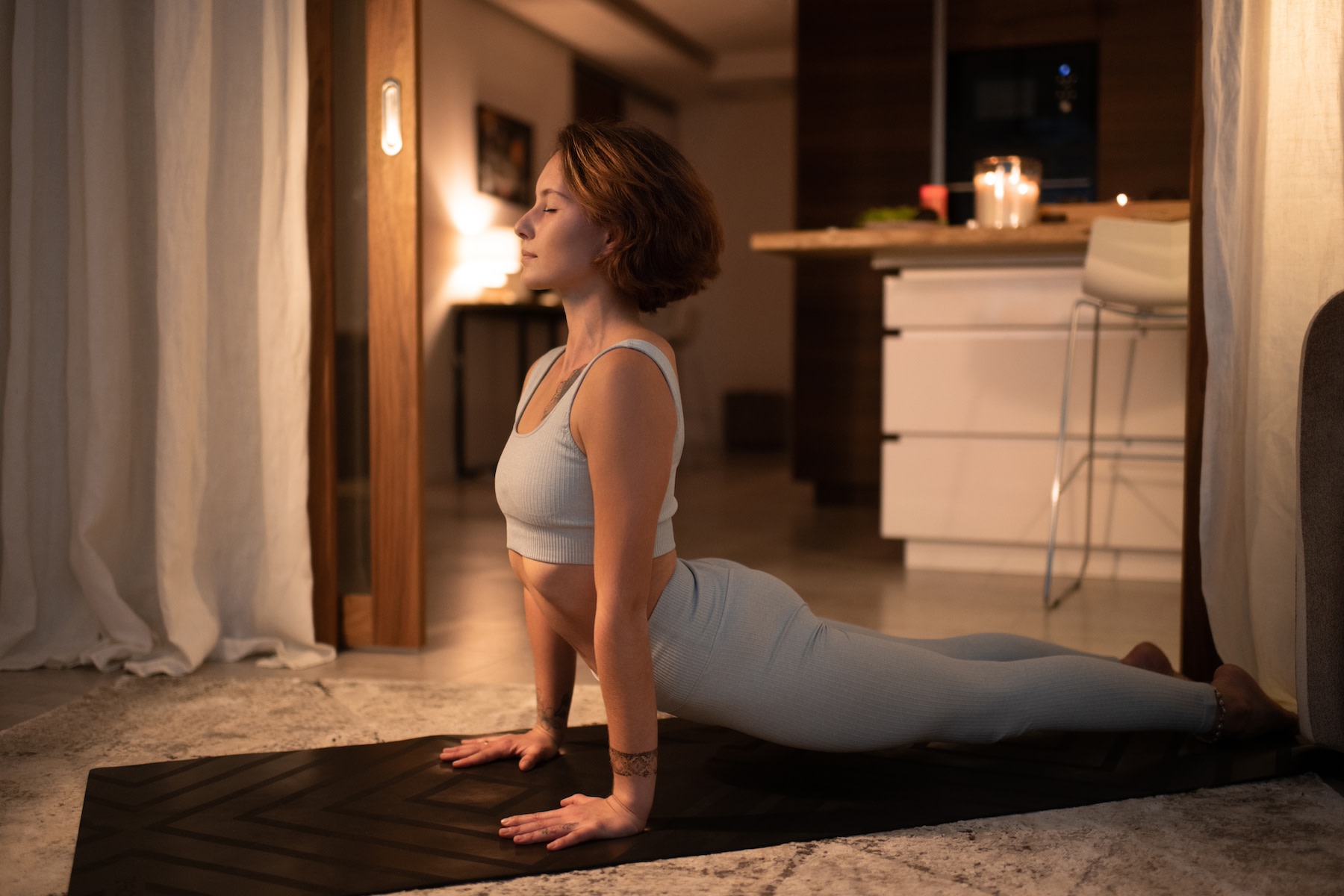
dusanpetkovic / iStock / Getty Images Plus via Getty Images
6 Pros & Cons of Working Out at Night
Love exercising in the evening? Follow these four pro tips so it doesn't hurt your sleep.
By Sarah Klein•
Is Working Out at Night Bad?
Advantages of Working Out at Night
Drawbacks of Working Out at Night
Tips for Working Out at Night
The Takeaway
Exercise is like a well-crafted comedy routine: Timing matters. You won’t get the payoff of a big laugh if your joke delivery is off. Similarly, conventional wisdom tells us exercising at night will hurt your sleep so much, it’s hardly even worth it for the cardio, strength, and mental health benefits. But the existence of 24-hour gyms alone is proof people exercise at all hours of the day and night. So how harmful could it really be to squeeze in a sweat before bedtime? Is working out at night bad?
It turns out sleep experts aren’t as against nighttime workouts as you might have been led to believe. Keep reading to learn why it's not all bad news, and find some expert-approved tips for sleeping well after evening exercise.
Is Working Out at Night Bad?
Despite what you may have heard, there’s nothing inherently wrong with working out at night. It’s always better for your sleep to get some exercise rather than none at all, according to the National Sleep Foundation (NSF).
And for plenty of people, evenings are their only opportunity to break a sweat. Any number of logistical hurdles—school drop-offs, work schedules, simply wanting or needing more time to sleep in—make nighttime workouts best for some people.
Fortunately, you don’t have to forgo all nighttime exercise—but it does help to be intentional about how you work out at night. And if you’re going to exercise in the evenings, it’s important to make sure you can still wind down before bed (more on that below).
Plus, you might want to tweak the time you work out depending on your goals. Research suggests morning workouts are best for exercise consistency, while afternoon workouts are linked to a longer lifespan, for example. As counterintuitive as it may seem, there are specific perks of exercising at night, too.
Advantages of Working Out at Night
Nighttime exercise isn’t everyone’s cup of tea—and that’s OK! But if you like an evening workout, here are a few of the benefits you can look forward to:
You’ll Destress From the Day
Many of us are familiar with the rush of endorphins after a hard cycling class or the instant relief after kicking out some frustration on a punching bag. Exercise is well-known for easing stress and anxiety, and if you save your workout for the evening, you’ll watch the day’s stressors melt away.
It might help to be strategic about which calming workout you choose, though. “Even just a mindful walk, meditation, or yoga—that’s exercise, and that’s an excellent option to work on incorporating in the evening,” says Temitayo Oyegbile-Chidi, MD, PhD, chair of the board of directors for the NSF, associate professor in neurology at the University of California Davis, and adjunct professor at Georgetown University Hospital.
“After a long day, when our brains are working overtime, the opportunity to find some time to relax and exercise while you’re at it is actually really, really good,” she says.
It Might Actually Improve Your Sleep
Regular exercise is linked to so many benefits: aging well, a lower risk of heart disease, improved mental health, and, you guessed it, getting a good night’s sleep.
People who say they exercise regularly were more likely to report sleeping well every night or almost every night compared to people who say they don’t exercise, according to a 2013 poll conducted by the NSF, even though both groups got about seven hours of rest each weeknight.
The results of a 2019 meta-analysis published in Sports Medicine added even more convincing evidence to this argument: Researchers found working out at night increased the amount of time people spent in slow-wave sleep, the deepest type of sleep. That said, timing matters: Researchers found that sleep efficiency, total sleep time, and the time it takes to fall asleep can get worse if you do a vigorous workout within an hour of bedtime.
You Could Have Better Gym Access
Most people are more motivated and energized to exercise earlier in the day, says Angela Holliday-Bell, MD, a certified sleep specialist and CEO of The Solution is Sleep.
If you’re a night owl heading to a gym, this might play to your advantage: You may find fewer people waiting around to use the most sought-after equipment later in the evenings, in addition to simply enjoying a quieter gym.

Cavan Images / Cavan via Getty Images
Drawbacks of Working Out at Night
That said, evening workouts still have their downsides. Here are a few potential cons to keep in mind:
You Might Be Less Likely to Stick With It
Morning exercisers can check that workout off their to-do lists bright and early without the chance of distractions getting in the way. Nighttime exercisers might think, “‘I'll get to that later,’ and then later never comes,” Dr. Holliday-Bell says. Plus, your energy may wane throughout the day, leaving you without the oomph needed to break a sweat for your evening workout when the time you had allotted for it finally rolls around.
In fact, in a 2019 study published in Obesity, the most consistent exercisers were more likely to get their workouts done in the morning, compared to people who worked out in the afternoon or evening.
It Could Make It Harder to Fall Asleep
Think about the last high-intensity workout you did: Your heart was pumping, you were dripping sweat, your energy was up. Unsurprisingly, these are not good conditions for drifting off to dreamland.
If your workouts are really vigorous, Dr. Oyegbile-Chidi says, they might keep you up later—and could even lead to more disrupted sleep overnight. “The key is to not have very strenuous exercise right before bed,” she says.
And it’s not just because you’re all revved up from a shadowboxing class: In the evenings, your body temperature naturally drops by a degree or two to “facilitate the transition to sleep,” Dr. Holliday-Bell says. Intense exercise too close to bedtime could increase your body temperature enough to delay the pre-sleep drop, she says.
There Might Be Fewer In-Person Classes Scheduled
If you like to do in-person group workouts, you might find there aren’t as many options on the calendar at your gym at night. For most brick-and-mortar gyms, there simply isn’t enough demand to hold classes at night, considering the morning birds have long since finished their workouts for the day.
Fortunately, the on-demand workouts on the Peloton App make it easy to take your favorite classes anytime, anywhere. But if you’re motivated by in-person group workouts, you may have more options to exercise earlier in the day.

Peloton App
Access thousands of classes with no equipment needed.
Tips for Working Out at Night
Make working out at night work for you by following these expert-approved tips for a solid sweat and a good night’s sleep:
1. Time It Right
Aim to wrap up your workout at least a couple of hours before bed, Dr. Oyegbile-Chidi says. That will give your body and mind time to cool down before you hit the hay.
As mentioned above, researchers found that vigorous exercise that ended within an hour of bedtime was linked with lower total sleep time and a longer time to fall asleep. It might take a little trial and error to determine how much time your body needs between the end of a workout and the beginning of a good night’s sleep.
2. Stick to Lower-Intensity Workouts
When you can, save workouts that don’t get your heart rate and body temperature up as high for your evening sweat sessions, Dr. Holliday-Bell says. That might look like restorative yoga or Pilates, walking, or even strength training. Reserve HIIT classes, cycling, running, and other high-intensity cardio for days when you can manage earlier workouts so you’re not totally revved up before bed.
If you really have no other time to squeeze in those higher-intensity sessions, try to do at least a short cooldown before you wrap up in the evening. “Some gentle stretching or relaxing yoga poses can help get the heart rate back down,” Dr. Oyegbile-Chidi says.
3. Consider a Warm Shower
A cozy, calming warm shower or bath doesn’t just relax you before bed, it might also help facilitate that drop in body temperature that signals it’s sleepy time. Here’s why, according to Dr. Holliday-Bell: A warm shower dilates the blood vessels in your hands and feet, which in turn lowers your core body temperature. That mimics the drop in temperature your body naturally experiences before bed.
So, if your temperature is higher than normal because you just worked out, nudging it in the cooler direction might help. But it’s not exactly clear by how much, she says. (Still, you probably want to rinse off anyway, so it can’t hurt to try!)
4. Develop a Consistent Bedtime Routine
In a perfect world, Dr. Oyegbile-Chidi says, we’d all be in the habit of going to bed at the same time every night and spending 30–60 minutes before then easing ourselves into sleep. If that doesn’t sound like you, but you like to exercise at night, it’s time to create your own bedtime routine.
That might look like dimming the lights, turning your phone off (or at least switching it to silent and tucking it away), sipping chamomile tea, journaling, or anything else you find relaxing, she says.
After a nighttime workout, lean on this unwinding time to help you nod off. “We aren’t easily able to go from 100 to zero without a wind-down period that helps our body prepare for sleep,” Dr. Oyegbile-Chidi says. Allowing for a few extra meditative minutes before bed on the nights you exercise later in the day might help.
The Takeaway
It isn’t necessarily bad to work out at night, as long as it feels good to you and you follow the tips above. If it’s most convenient for you to exercise in the evenings and you don’t think it’s tampering with your sleep, there’s no reason to adjust when you exercise, Dr. Holliday-Bell says.
But if nighttime workouts are messing up your sleep, it’s worth experimenting with exercising at different times of the day until you find a better fit.
“Daily exercise is good for sleep, period,” she says. “Ideally that’s earlier in the day, but if there’s someone who can’t fit it in, it’s best to do it than not to do it.”
This content is for informational and educational purposes only and does not constitute individualized advice. It is not intended to replace professional medical evaluation, diagnosis, or treatment. Seek the advice of your physician for questions you may have regarding your health or a medical condition. If you are having a medical emergency, call your physician or 911 immediately.
This content is for informational and educational purposes only and does not constitute individualized advice. It is not intended to replace professional medical evaluation, diagnosis, or treatment. Seek the advice of your physician for questions you may have regarding your health or a medical condition. If you are having a medical emergency, call your physician or 911 immediately.
Get our latest health stories straight to your inbox
Enter your email to get articles, expert-backed tips, and updates from Peloton sent to your inbox.
By providing your email address, you agree to receive marketing communications from Peloton.
For more about how we use your information, see our Privacy Policy.









